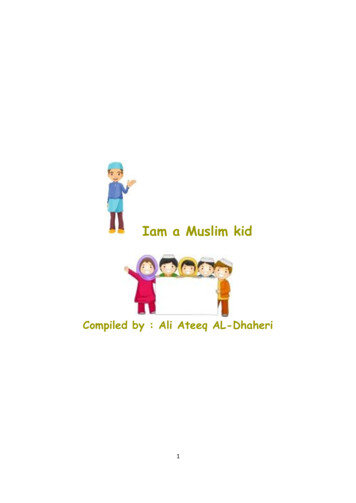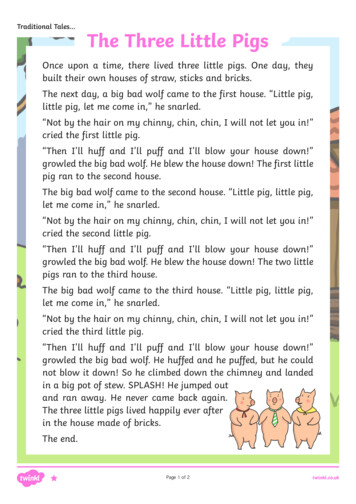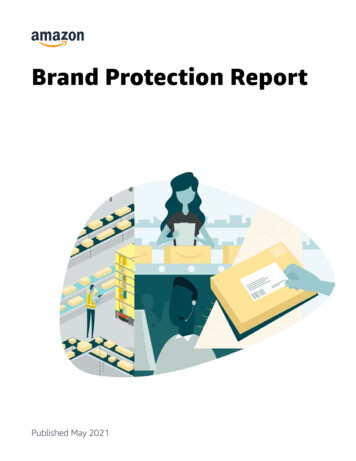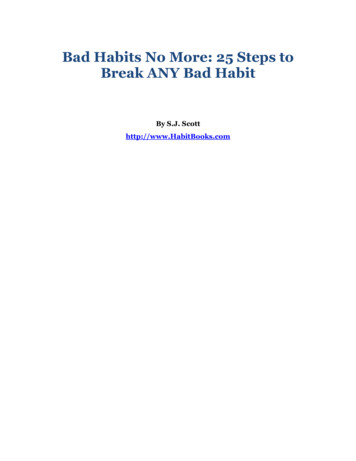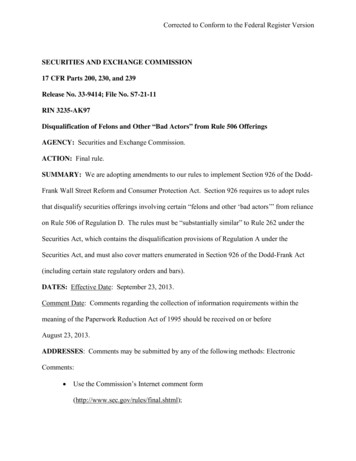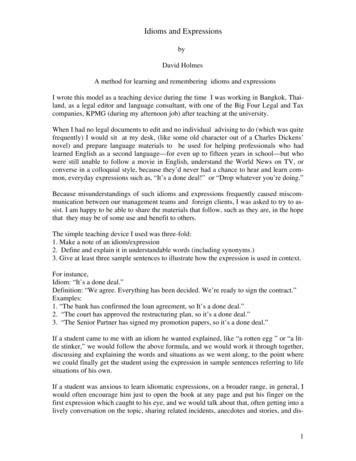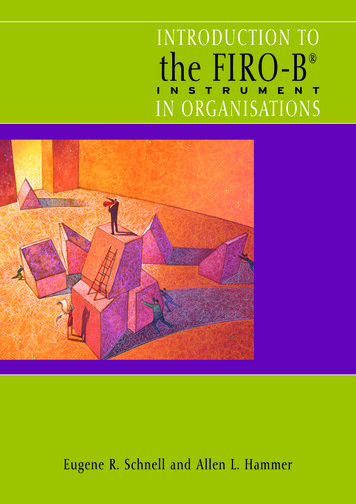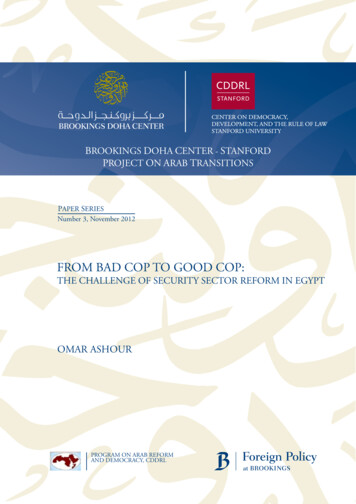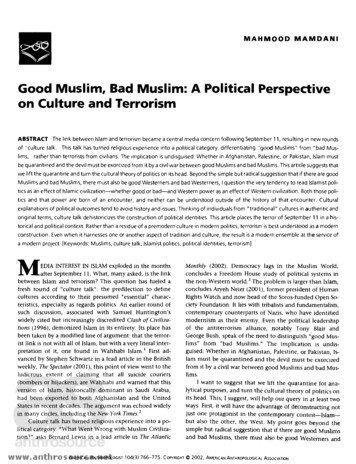
Transcription
MAHMOOD MAMDANIGood Muslim, Bad Muslim: A Political Perspectiveon Culture and TerrorismABSTRACT The link between Islam and terrorism became a central media concern following September 11, resulting in new roundsof "culture talk. This talk has turned religious experience into a political category, differentiating 'good Muslims" from "bad Muslims, rather than terrorists from civilians. The implication is undisguised: Whether in Afghanistan, Palestine, or Pakistan, Islam mustbe quarantined and the devil must be exorcized from it by a civil war between good Muslims and bad Muslims. This article suggests thatwe lift the quarantine and turn the cultural theory of politics on its head. Beyond the simple but radical suggestion that if there are goodMuslims and bad Muslims, there must also be good Westerners and bad Westerners, I question the very tendency to read Islamist politics as an effect of Islamic civilization—whether good or bad—and Western power as an effect of Western civilization. Both those politics and that power are born of an encounter, and neither can be understood outside of the history of that encounter. Culturalexplanations of political outcomes tend to avoid history and issues. Thinking of individuals from "traditional" cultures in authentic andoriginal terms, culture talk dehistoricizes the construction of political identities. This article places the terror of September 11 in a historical and political context. Rather than a residue of a premodern culture in modern politics, terrorism is best understood as a modernconstruction. Even when it harnesses one or another aspect of tradition and culture, the result is a modern ensemble at the service ofa modern project. [Keywords: Muslims, culture talk, Islamist politics, political identities, terrorism]MEDIA INTEREST IN ISLAM exploded in the monthsafter September 11. What, many asked, is the linkbetween Islam and tenorism? This question has fueled afresh round of "culture talk": the predilection to definecultures according to their presumed "essential" characteristics, especially as regards politics, An earlieT round ofsuch discussion, associated with Samuel Huntington'swidely cited but increasingly discredited Clash of Civilizations (1996), demonized Islam in its entirety, Its place hasbeen taken by a modified line of argument: that the terrorist link is not with all of Islam, but with a very literal interpretation of it, one found in Wahhabi Islam,1 First advanced by Stephen Schwartz in a lead article in the Britishweekly, The Spectator (2001), this point of view went to theludicrous extent of claiming that all suicide couriers(bombers or hijackers), are Wahhabi and warned that thisversion of Islam, historically dominant in Saudi Arabia,had been exported to both Afghanistan and the UnitedStates in recent decades. The argument was echoed widelyin many circles, including the New York Times2Culture talk has turned religious experience into a political category, "What Went Wrong with Muslim Civilization?" asks Bernard Lewis in a lead article in The AtlanticMonthly (2002), Democracy lags in the Muslim World,concludes a Freedom House study of political systems inthe non-Western world,3 The problem is larger than Islam,concludes Aryeh Neier (2001), former president of HumanRights Watch and now head of the Soros-funded Open Society Foundation: It lies with tribalists and fundamentalists,contemporary counterparts of Nazis, who have identifiedmodernism as their enemy, Even the political leadershipof the antiterrorism alliance, notably Tony Blair andGeorge Bush, speak of the need to distinguish "good Muslims" from "bad Muslims," The implication is undisguised: Whether in Afghanistan, Palestine, or Pakistan, Islam must be quarantined and the devil must be exorcizedfrom it by a civil war between good Muslims and bad Muslims,I want to suggest that we lift the quarantine for analytical purposes, and turn the cultural theory of politics onits head, This, I suggest, will help our query in at least twoways, First, it will have the advantage of deconstructing notjust one protagonist in the contemporary contest—Islam—but also the other, the West, My point goes beyond thesimple but radical suggestion that if there are good Muslimsand bad Muslims, there must also be good Westerners andAMERICAN ANTHROPOLOGIST 1 0 4 ( 3 ) : 7 6 6 - 7 7 5 . COPYRIGHT 2 0 0 2 , AMERICAN ANTHROPOLOGICAL ASSOCIATION
Mamdani Good Muslim, Bad Muslimbad Westerners, I intend to question the very tendency toread Islamist politics as an effect of Islamic civilization—whether good or bad—and Western power as an effect ofWestern civilization, Further, I shall suggest that boththose politics and that power are born of an encounter,and neither can be understood in isolation, outside of thehistory of that encounter,Second, I hope to question the very premise of culturetalk, This is the tendency to think of culture in political—and therefore territorial—terms, Political units (states)are territorial; cultuie is not, Contemporary Islam is aglobal civilization: fewer Muslims live in the Middle Eastthan in Africa or in South and Southeast Asia. If we canthink of Christianity and Judaism as global religions—with Middle Eastern origins but a historical flow and acontemporary constellation that cannot be made sense ofin terms of state boundaries—then why not try to understand Islam, too, in historical and extraterritorial terms?4Does it really make sense to write political histories of Islam that read like political histories of geographies like theMiddle East, and political histories of Middle Easternstates as if these were no more than the political history ofIslam in the Middle East?My own work (1996) leads me to trace the modernroots of culture talk to the colonial project known as indirectrule, and to question the claim that anticolonial politicalresistance really expresses a cultural lag and should be understood as a traditional cultural resistance to modernity,This claim downplays the crucial encounter with colonialpower, which I think is central to the post-September 11analytical predicament I described above, I find culturetalk troubling for two reasons, On the one hand, culturalexplanations of political outcomes tend to avoid historyand issues, By equating political tendencies with entirecommunities denned in nonhistorical cultural terms, suchexplanations encourage collective discipline and punishment—a practice characteristic of colonial encounters,This line of reasoning equates terrorists with Muslims, justifies a punishing war against an entire country (Afghanistan) and ignores the recent history that shaped both thecurrent Afghan context and the emergence of political Islam, On the other hand, culture talk tends to think of individuals (from "traditional" cultures) in authentic andoriginal terms, as if their identities are shaped entirely bythe supposedly unchanging culture into which they areborn, In so doing, it dehistoricizes the construction of political identities,Rather than see contemporary Islamic politics as theoutcome of an archaic culture, I suggest we see neither culture nor politics as archaic, but both as very contemporaryoutcomes of equally contemporary conditions, relations,and conflicts, Instead of dismissing history and politics, asculture talk does, I suggest we place cultural debates in historical and political contexts, Terrorism is not born of theresidue of a premodern culture in modern politics, Rather,terrorism is a modern construction, Even when it harnesses one or another aspect of tradition and culture, the767result is a modern ensemble at the service of a modernproject,CULTURE TALKIs our world really divided into the modern and premodern, such that the former makes culture in which the latteris a prisoner? This dichotomy is increasingly prevalent inWestern discussions of relations with Muslim-majoritycountries, It presumes that culture stands for creativity, forwhat being human is all about, in one part of the world,that called modern, but that in the other part, labeledpremodern,'' culture stands for habit, for some kind of instinctive activity whose rules are inscribed in early founding texts, usually religious, and mummified in early artifacts. When I read of Islam in the papers these days, Ioften feel I am reading of museumized peoples, of peopleswho are said not to make culture, except at the beginningof creation, as some extraordinary, prophetic act. Afterthat, it seems they—we Muslims—just conform to culture,Our culture seems to have no history, no politics, and nodebates, It seems to have petrified into a lifeless custom.Even more, these people seem incapable of transformingtheir culture, the way they seem incapable of growingtheir own food, The implication is that their salvation lies,as always, in philanthropy, in being saved from the outside,If the premodern peoples are said to lack a creative capacity, they are conversely said to have an abundant capacity for destruction, This is surely why culture talk hasbecome the stuff of front-page news stories, It is, after all,the reason we are told to give serious attention to culture,It is said that culture is now a matter of life and death, Toone whose recent academic preoccupation has been theinstitutional legacy of colonialism, this kind of writing isdeeply reminiscent of tracts from the history of moderncolonization, This history assumes that people's public behavior, specifically their political behavior, can be readfrom their religion, Could it be that a person who takes hisor her religion literally is a potential terrorist? That onlysomeone who thinks of a religious text as not literal, butas metaphorical or figurative, is better suited to civic lifeand the tolerance it calls for? How, one may ask, does theliteral reading of sacred texts translate into hijacking, murder, and terrorism?Some may object that I am presenting a caricature ofwhat we read in the press, After all, is there not less talkabout the clash of civilizations, and more about the clashinside Islamic civilization? Is that not the point of the articles 1 refened to earlier? Certainly, we are now told to distinguish between good Muslims and bad Muslims, Mindyou, not between good and bad persons, nor betweencriminals and civic citizens, who both happen to be Muslims, but between good Muslims and bad Muslims. We aretold that there is a fault line running through Islam, a linethat separates moderate Islam, called "genuine Islam,from extremist political Islam. The terrorists of September
768American Anthropologist Vol. 104, No. 3 September 200211, we are told, did not just hijack planes; they also hijacked Islam, meaning "genuine" Islam,I would like to offer another version of the argumentthat the clash is inside—and not between—civilizations,The synthesis is my own, but no strand in the argument isfabricated, I rather think of this synthesis as an enlightened version, because it does not just speak of the "other,"but also of self, It has little trace of ethnocentrism. This ishow it goes: Islam and Christianity have in common adeeply messianic orientation, a sense of mission to civilizethe world, Each is convinced that it possesses the soletruth, that the world beyond is a sea of ignorance thatneeds to be redeemed.5 In the modern age, this kind ofconviction goes beyond the religious to the secular, beyond the domain of doctrine to that of politics, Yet evenseemingly secular colonial notions such as that of a civilizing mission"—or its more racialized version, "the whiteman's burden"—or the 19th-century U,S, conviction of a"manifest destiny" have deep religious roots,Like any living tradition, neither Islam nor Christianity is monolithic. Both harbor and indeed are propelled bydiverse and contradictory tendencies, In both, righteousnotions have been the focus of prolonged debates, Even ifyou should claim to know what is good for humanity,how do you proceed? By persuasion or force? Do you convince others of the validity of your truth or do you proceed by imposing it on them? Is religion a matter of conviction or legislation? The first alternative gives you reasonand evangelism; the second gives you the Crusades andjihad. Take the example of Islam, and the notion of jihad,which roughly translated means "struggle.' Scholars distinguish between two broad traditions of jihad: jihad Akbar (the greater jihad) and jihad Asgar (the lesser jihad),The greater jihad, it is said, is a struggle against weaknessesof self; it is about how to live and attain piety in a contaminated world, The lesser jihad, in contrast, is aboutself-preservation and self-defense; more externally directed, it is the source of Islamic notions of what Christians call "just war" (Noor 2001),Scholars of Islam have been at pains since September11 to explain to a non-Muslim reading public that Islamhas rules even for the conduct of war: for example, TalalAsad (n.d.) points out that the Hanbali School of law practiced by followers of Wahhabi Islam in Saudi Arabia outlaws the killing of innocents in war, Historians of Islamhave warned against a simple reading of Islamic practicefrom Islamic doctrine; After all, coexistence and tolerationhave been the norm, rather than the exception, in the political history of Islam, More to the point, not only religious creeds like Islam and Christianity, but also seculardoctrines like liberalism and Marxism have had to face anongoing contradiction between the impulse to universalism and respective traditions of tolerance and peaceful coexistence, The universalizing impulse gives the UnitedStates a fundamentalist orientation in doctrine, just as thetradition of tolerance makes for pluralism in practice andin doctrine.Doctrinal tendencies aside, I remain deeply skepticalof the claim that we can read people's political behaviorfrom their religion, or from their culture, Could it be truethat an orthodox Muslim is a potential terrorist? Or, thesame thing, that an Orthodox Jew or Christian is a potential terrorist and only a Reform Jew or a Christian convertto Darwinian evolutionary theory is capable of being tolerant of those who do not share his or her convictions?I am aware that this does not exhaust the question ofculture and politics, How do you make sense of a politicsthat consciously wears the mantle of religion? Take, forexample the politics of Osama bin Laden and al-Qaeda;both claim to be waging a jihad, a just war against the enemies of Islam, To try to understand this uneasy relationship between politics and religion, 1 find it necessary notonly to shift focus from doctrinal to historical Islam, fromdoctrine and culture to history and politics, but also tobroaden the focus beyond Islam to include larger historical encounters, of which bin Laden and al-Qaeda havebeen one outcome,THE COLD WAR AFTER INDOCHINAEqbal Ahmad draws our attention to the television imagefrom 1985 of Ronald Reagan inviting a group of turbanedmen, all Afghan, all leaders of the mujahideen, to theWhite House lawn for an introduction to the media."These gentlemen are the moral equivalents of America'sfounding fathers," said Reagan (Ahmad 2001), This wasthe moment when the United States tried to harness oneversion of Islam in a struggle against the Soviet Union, Before exploring its politics, let me provide some historicalbackground to the moment,1 was a young lecturer at the University of Dar-esSalaam in Tanzania in 1975, It was a momentous year inthe decolonization of the world as we knew it, 1975 wasthe year of the U,S, defeat in Indochina, as it was of thecollapse of the last European empire in Africa, In retrospect, it is clear that it was also the year that the center ofgravity of the Cold War shifted from Southeast Asia tosouthern Africa, The strategic question was this; Whowould pick up the pieces of the Portuguese empire in Africa, the United States or the Soviet Union? As the focalpoint of the Cold War shifted, there was a correspondingshift in U,S, strategy based on two key influences, First,the closing years of the Vietnam War saw the forging of aNixon Doctrine, which held that "Asian boys must fightAsian wars." The Nixon doctrine was one lesson that theUnited States brought from the Vietnam debacle, Even ifthe hour was late to implement it in Indochina, the NixonDoctrine guided U,S, initiatives in southern Africa, In thepost-Vietnam world, the United States looked for morethan local proxies; it needed regional powers as juniorpartners, In southern Africa, that role was fulfilled byapartheid South Africa, Faced with the possibility of a decisive MPLA victory in Angola,6 the United States encouraged South Africa to intervene militarily, The result was a
Mamdani Good Muslim, Bad Muslimpolitical debacle that was second only to the Bay of Pigsinvasion of a decade before: No matter its militarystrength and geopolitical importance, apartheid South Africa was clearly a political liability for the United States,Second, the Angolan fiasco reinforced public resistancewithin the United States to further overseas Vietnam-typeinvolvement, The clearest indication that popular pressures were finding expression among legislators was the1975 Clark amendment, which outlawed covert aid tocombatants in the ongoing Angolan civil war,The Clark amendment was repealed at the start ofReagan's second term in 1985, Its decade-long durationfailed to forestall the Cold Warriors, who looked for waysto bypass legislative restrictions on the freedom of executive action. CIA chief William Casey took the lead in orchestrating support for terrorist and prototerrorist movements around the world—from Contras in Nicaragua tothe Mujahideen in Afghanistan, to Mozambican NationalResistance (RENAMO) in Mozambique7 and National Union for the Total Independence of Angola (UNITA) in Angola8—through third and fourth parties, Simply put, afterthe defeat in Vietnam and the Watergate scandal, theUnited States decided to harness, and even to cultivate,terrorism in the struggle against regimes it considered proSoviet. The high point of the U,S, embrace of terrorismcame with the Contras, More than just tolerated andshielded, they were actively nurtured and directly assistedby Washington. But because the Contra story is so wellknown, I will focus on the nearly forgotten story of U.S.support for terrorism in Southern Africa to make mypoint,South Africa became the Reagan Administration's preferred partner for a constructive engagement, a term coinedby Reagan's Assistant Secretary of State for Africa, ChesterCrocker, The point of "constructive engagement" was tobring South Africa out of its political isolation and tap itsmilitary potential in the war against militant—pro-Soviet—nationalism,9 The effect of "constructive engagement"was to bring to South African regional policy the sophistication of a blend of covert and overt operations: In Mozambique, for example, South Africa combined an officialpeace accord (the 1984 Nkomati agreement) with continued clandestine material support for RENAMO terrorism,10Tragically, the United States entered the era of "constructive engagement" just as the South African military tightened its hold over government and shifted its regionalpolicy from detente to "total onslaught.I do not intend to explain the tragedy of Angola andMozambique as the result of machinations by a single superpower. The Cold War was fought by two superpowers,and both subordinated local interests and consequences toglobal strategic considerations, Whether in Angola or inMozambique, the Cold War interfaced with an internalcivil war, An entire generation of African scholars has beenpreoccupied with understanding the relation between external and internal factors in the making of contemporaryAfrica and, in that context, the dynamic between the Cold769War and the civil war in each case. My purpose is not toenter this broader debate, Here, my purpose is more modest, I am concerned not with the civil war, but only theCold War and, furthermore, not with both adversaries inthe Cold War, but only the United States, My limited purpose is to illuminate the context in which the UnitedStates embraced terrorism as it prepared to wage the ColdWar to a finish.The partnership between the United States and apartheid South Africa bolstered two key movements that usedterror with abandon: RENAMO in Mozambique, andUNITA in Angola," RENAMO was a terrorist outfit createdby the Rhodesian army in the early 1970s—and patronized by the South African Defense Forces. UNITA was moreof a prototerrorist movement with a local base, though onenot strong enough to have survived the short bout of civilwar in 1975 without sustained external assistance. UNITAwas a contender for power, even if a weak one, whileRENAMO was not—which is why the United States couldnever openly support this creation of Rhodesian andSouth African intelligence and military establishments.Because the 1975 debacle in Angola showed that South Africa could not be used as a direct link in U.S. assistance,and the Clark amendment barred U.S. covert aid in Angola, the CIA took the initiative to find fourth parties—such as Morocco—through which to train and support UNITA. Congressional testimony documented at leastone instance of a 15-million-dollar payment to UNITAthrough Morocco in 1983, Savimbi, the UNITA chief, acknowledged the ineffectiveness of the Clark amendmentwhen he told journalists, "A great country like the UnitedStates has other channelsthe Clark amendment meansnothing" (in Minter 1994:152).By any reckoning, the cost of terrorism in SouthernAfrica was high. A State Department consultant who interviewed refugees and displaced persons concluded thatRENAMO was responsible for 95 percent of instances ofabuse of civilians in the war in Mozambique, includingthe murder of as many as 100,000 persons, A 1989 UnitedNations study estimated that Mozambique suffered aneconomic loss of approximately 15 billion between 1980and 1988, a figure five and a half times its 1988 GDP (Minter1994), Africa Watch researchers documented UNITA strategies aimed at starving civilians in government-held areas, through a combination of direct attacks, kidnappings,and the planting of land mines on paths used by peasants.The extensive use of land mines put Angola in the ranks ofthe most mined countries in the world (alongside Afghanistan and Cambodia), with amputees conservativelyestimated at over 15,000, UN1CEF calculated that .-531,000died of causes directly or indirectly related to the war. TheUN estimated the total loss to the Angolan economy from1980 to 1988 at 30 billion, six times the 1988 GDP(Minter 1994:4-5).The CIA and the Pentagon called terrorism by anothername: "low intensity conflict," Whatever the name, political terror brought a kind of war that Africa had never seen
770American Anthropologist Vol. 104, No, 3 September 2002before, The hallmark of terror was that it targeted civilianlife: blowing up infrastructure such as bridges and powerstations, destroying health and educational centers, mining paths and fields, Terrorism distinguished itself fiomguerrilla waT by making civilians its preferred target, Ifleft-wing guenillas claimed that they weie like fish inwater, rightwing terrorists were determined to drain thewateT—no matter what the cost to civilian life—so as toisolate the fish. What is now called collateral damage wasnot an unfortunate byproduct of the war; it was the verypoint of terrorism,Following the repeal of the Claik amendment at thestaTt of Reagan's second teim, the United States provided 13 million worth of "humanitarian aid" to UNITA, then 15 million for "military assistance," Even when South African assistance to UNITA dried up following the internalAngolan settlement in May 1991, the United Statesstepped up its assistance to UNITA in spite of the fact thatthe Cold War was over. The hope was that terrorismwould deliver a political victory in Angola, as it had inNicaragua, The logic was simple; The people would surelyvote the terrorists into power if the level of collateral damage could be made unacceptably high,Even after the Cold War, U,S, tolerance for terror remained high, both in Africa and beyond, The callousnessof Western response to the 1994 genocide in Rwanda wasno exception. Or consider the afteimath of January 6,1999, when Revolutionary United Front (RUF) gunmenmaimed and raped theiT way across Freetown, the capitalof Sierra Leone, killing ovei 5,000 civilians in a day, TheBritish and U,S, response was to pressure the governmentto share power with RUF rebels,AFGHANISTAN; THE HIGH POINT IN THE COLD WARThe shifting center of gravity of the Cold War was the major context in which Afghanistan policy was framed, butthe Iranian Revolution of 1979 was also a crucial factor,Ayatollah Khomeini anointed the United States as the"Great Satan," and pro-U,S, Islamic countries as "American Islam,' Rather than address specific sources of Iranianresentment against the United States, the Reagan administration resolved to expand the pro-U,S, Islamic lobby inorder to isolate Iran, The strategy was two-pronged, First,with respect to Afghanistan, it hoped to unite a billionMuslims worldwide around a holy war, a crusade, againstthe Soviet Union, 1 use the word crusade, not jihad, becauseonly the notion of crusade can accurately convey the frameof mind in which this initiative was taken, Second, theReagan administration hoped to turn a doctrinal difference inside Islam between minority Shia and majority Sunniinto a political divide. It hoped thereby to contain the influence of the Iranian Revolution as a minority Shia affair,The plan went into high gear in 1986 when CIA chiefWilliam Casey took three significant measures (Rashid 2000,129-130), The first was to convince Congress to step upthe anti-Soviet war in Afghanistan by providing the mujahideen with U,S, advisors and U,S,-made Stinger antiaircraft missiles to shoot down Soviet planes, The second wasto expand the Islamic guerrilla war from Afghanistan intothe Soviet Republics of Tajikistan and Uzbekistan, a decision reversed when the Soviet Union threatened to attackPakistan in retaliation. The third was to recruit radicalMuslims from around the world to come and train in Pakistan and fight with the Afghan mujahideen, The Islamicworld had not seen an armed jihad for centuries, Now theCIA was determined to create one, to put a version of tradition at the service of politics. Thus was the tradition ofjihad—of a just war with a religious sanction, nonexistentin the last 400 years—revived with U.S. help in the 1980s,In a 1990 radio interview, Eqbal Ahmad explained how"CIA agents started going all over the Muslim world recruiting people to fight,"12 Pervez Hoodbhoy recalled,With Pakistan's Zia-ul-Haq as America's foremost ally, theCIA advertised foT, and openly recruited, Islamic holywarriors from Egypt, Saudi Arabia, Sudan, and Algeria,Radical Islam went into overdrive as its superpower allyand mentor funneled support to the Mujahidin, andRonald Regan feted them on the lawn of the WhiteHouse, lavishing praise on "brave freedom fighters challenging the Evil Empire. [2001]This is the context in which a U,S,/Saudi/Pakistani alliance was forged, and in which religious madrasahs wereturned into political schools for training cadres, The CIAdid not just fund the jihad; it also played "a key role intraining the mujahideen" (Chossudovsky 2001), Thepoint was to integrate guerilla training with the teachingsof Islam and, thus, create "Islamic guerrillas," The Indianjournalist Dilip Hiro (1995) explained:Predominant themes were that Islam was a complete sociopolitical ideology, that holy Islam was being violatedby (the) atheistic Soviet troops, and that the Islamic people of Afghanistan should reassert their independence byoverthrowing the leftist Afghan regime propped up byMoscow, [in Chossudovsky 2001]The CIA looked for, but was unable to find, a SaudiPrince to lead this crusade, It settled for the next bestthing, the son of an illustrious family closely connected tothe Saudi royal house, We need to remember that Osamabin Laden did not come from a backwater family steepedin premodernity, but from a cosmopolitan family, The binLaden family is a patron of scholarship: it endows programs at universities like Harvard and Yale, Bin Laden wasrecruited with US. approval, and at the highest level, byPrince Turki al-Faisal, then head of Saudi intelligence(Blackburn 2001:3), This is the context in which Osamabin Laden helped build, in 1986, the Khost tunnel complex deep under the mountains close to the Pakistani border, a complex the CIA funded as a major arms depot, as atraining facility, and as a medical center for the mujahideen, It is also the context in which bin Laden set up, in1989, al-Qaeda, or military base, as a service center forArab Afghans and their families (Rashid 2000:132),
Mamdani Good Muslim, Bad MuslimThe idea of an Islamic global war was not a brainchildof bin Laden; the CIA and Pakistan's Inter Services Intelligence (ISI) hoped to transform the Afghan jihad into aglobal war waged by Muslim states against the Soviet Union, Al-Qaeda networks spread out beyond Afghanistan: toChechnya and Kosovo (Blackburn 2001:7), to Algeria andEgypt, even as fai as Indonesia, The numbers involvedweie impiessive by any reckoning, Wiiting in Foreign Affairs, Ahmad Rashid estimated that 35,000 Muslim ladicals from 40 Islamic countries joined Afghanistan's fightin the decade between 1982 and 1992, Eventually Rashidnotes, the Afghan jihad came to influence moie than100,000 foreign Muslim radicals, (Rashid 1999), The nonAfghan Tecruits weie known as the Afghan-Aiabs OT, moiespecifically, as the Afghan-Algeiians oi the Afghan-Indonesians, The Afghan-Arabs constituted an elite force andleceived the most sophisticated tiaining (Chossudovsky2001), FighteTS in the PeshawaT-based Muslim "international brigade'' Teceived the relatively high
Mamdani Good Muslim, Bad Muslim 767 bad Westerners, I intend to question the very tendency to read Islamist politics as an effect of Islamic civilization— whether good or bad—and Western power as an effect of Western civilization, Further, I shall suggest that bot

